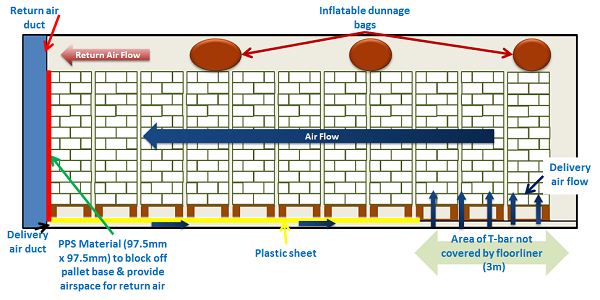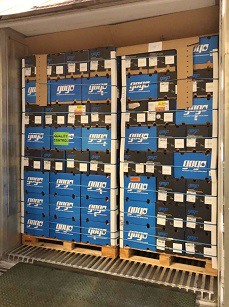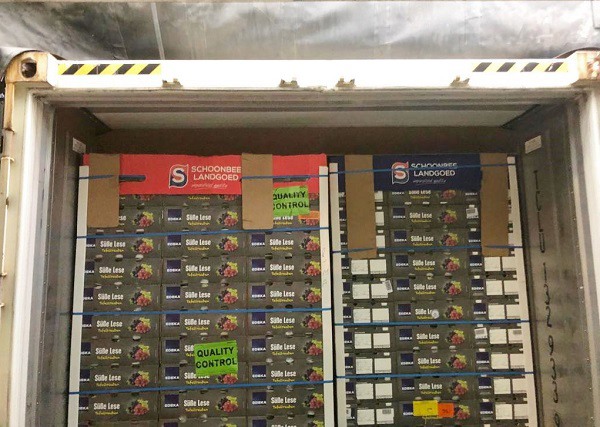In refrigerated containers the chilled air often short circuits, not keeping the fresh produce at the desired temperature.
“Cold air is lazy, it takes the path of least resistance,” explains Barry Hugo, managing director at Dunlash South Africa and Refrigerated Air Flow Technologies (RAFT).
This challenge led to the reasoning behind their new, redesigned RAFT kit that fits into any 40ft reefer container. This kit forces the chilled air to follow a more horizontal path, through the pallets. This is achieved by covering part of the container floor with a floor liner and blocking the air space above and below the pallets.
 Schematic of the air flow created by the RAFT Kit (in the newest design dunnage bags have been replaced by cardboard baffles)
Schematic of the air flow created by the RAFT Kit (in the newest design dunnage bags have been replaced by cardboard baffles)
As the chilled air is now delivered through a smaller surface area and not over the top of the load, the velocity of the air increases, resulting in improved penetration through the entire load and thus better management of fruit pulp temperature.
 Trials on stone fruit and citrus in containers packed with their RAFT kit, compared to control containers on the same voyage, have shown that their system is able to reduce the temperature difference within the load by 1.5°C to 2°C, with a direct impact on quality on arrival.
Trials on stone fruit and citrus in containers packed with their RAFT kit, compared to control containers on the same voyage, have shown that their system is able to reduce the temperature difference within the load by 1.5°C to 2°C, with a direct impact on quality on arrival.
The temperature remains more even from the front to the back of the container when cold air flow is forced through the pallets.
The RAFT kit has been patented in South Africa, the international patent is pending and the developers are not aware of its use anywhere else in the world.
The lockdown has put their planned avocado trials on hold, but Barry considers it more than probable that their kit, costing R800 (US$47) per container, will provide significantly more added value than its cost through offering better temperature management, either on its own in a reefer or as a complementary system to containers equipped with CA, MA or ozone generation.
Cardboard baffles replace inflatable dunnage bags
Instead of inflatable dunnage bags, requiring a compressor, the new design makes use of specially designed cardboard baffles placed between the top of the pallets in the container and the roof. In addition, baffles are placed at the pallet bases themselves. These baffles block off the cold air’s preferred shortcut, forcing virtually all of the cold air through the pallets of fruit themselves.
“The results we’ve obtained from our trials on citrus and plums were very good, there is a definite advantage to the kit.”

A temperature-sensitive commodity like table grapes would benefit from using their system, he notes.
International manufacturing and marketing agreements are available for select countries.
For more information: Barry Hugo
Barry Hugo
DunLash South Africa
Tel: +27 10 590 5865
Email: barry.hugo@dunlash.com
https://dunlash.com/
